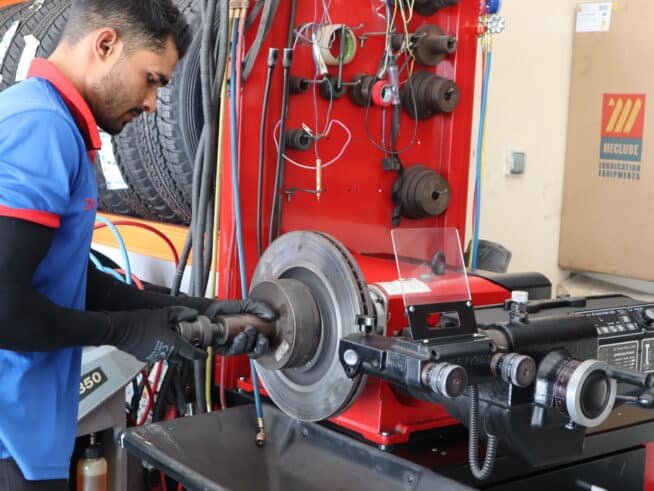The car brake system is among the most crucial for on-road safety. Brakes maintained in the right way can make a difference between a safe stop and a crash. With regular maintenance, it extends the life of your braking system while assuring that your vehicle performs when most needed. Here in this article, the highest tips to maintain efficiency in your car’s brake system are outlined, hence helping you maintain your brake in top condition.
1. Checking Brake Fluid Level Regularly
Brake fluid should form an important part of your braking system. It allows for the force that is applied on your brake pedal to be effectively transmitted to your brake pads and rotors in stopping your car. In the process, the brake fluid can absorb moisture, thus reducing its efficiency, and cause corrosion within the brake lines. To keep the brakes efficient:
– Regularly check the level of the brake fluid: Make sure it lies between the minimum and maximum marks in the reservoir.
– Change the brake fluid: Refer to the manufacturer’s recommendation, which usually is two years, so that it can serve with optimal performance.
2. Listen For Uncommon Sounds
Your brakes are designed to work noiselessly, so any other sound shows that something is amiss. Some of the common noises that one is likely to hear include:
– Squeaking or squealing: This means that the brake pads are becoming thin and require a replacement.
– Grinding: This noise normally happens when the brake pads are worn completely out and now the metal is grinding against the rotors; this may cause significant damage.
Please solve these issues right away so that no further damage will occur to your brake system.
3. Inspect the Brake Pads and Rotors Regularly
Brake pads and rotors are the actual components that stop your car in its tracks when pressure is applied to the brake pedal. As such, they wear out over time and require replacement. To keep your braking system efficient:
– Check on the brake pads: Keep checking their thickness after every short period. Most of the brake pads are designed with wear indicators, which produce noise once they become due for replacement.
– Inspect the rotors: Examine your rotor to see if they have any kind of wear, and this could be in the form of grooves or cracks. Sometimes you can resurface your rotors, but many times it will be best to simply replace them for peak braking.
4. Have Proper Tire Pressure
Tire pressure may not seem related to the brakes on a vehicle, but in actuality, it is an important element in brake performance. Properly inflated tires ensure your brakes are able to apply force evenly and effectively for stopping your car. Besides this, under- or over-inflated tires could also lead to uneven braking and raise possibilities of skidding. Check tire pressure regularly and maintain it at the levels recommended by the vehicle manufacturer.
5. Do Not Overload Your Vehicle
Overloading your vehicle adds extra work to your brake system. The more weight that is added, the more it wears on your brakes and can cause quicker wear. This way:
– Maintain your vehicle’s load within the recommended limits: Avoid loading heavy, unnecessary items in the vehicle.
– Distribute weight evenly: Ensure that the weight is evenly distributed in your vehicle to avoid putting any extra pressure on one part of the brake system.
6. Good Driving Habits
Your driving behaviors make a big difference in the life and efficiency of your braking system. Aggressive driving involving hard and frequent braking and speeding will wear out your brakes more quickly. To optimize brake life:
– Avoid hard braking: Stop gradually where and when feasible.
– Engine braking: Downshift to allow for the engine assist in braking and reduce the workload on the car’s brakes as much as possible when going over steep hills.
– Anticipate traffic conditions: Keep your eyes moving and look ahead. Leave yourself a time cushion for sudden stops.
7. Professional Inspections Periodically
While your braking system is regularly inspected and serviced by you, take it in to be mechanically checked by a professional technician at least once a year. A lot of things go wrong with brakes that a person might not see—like internal wear or minor leaks in brake lines. By catching things before they turn into very expensive repairs, regular inspections could actually save a person money in the long run.
8. Substitute Brake Components with Top-notch Parts
When replacement of brake components is required, always use good quality components like pads, rotors, or fluid. Cheap, substandard ones might save you money at the outset, but in the long run, they could wear down quickly and not do their job properly, thus possibly compromising your safety. Choose OEM parts or reputable aftermarket brands known for their reliability.
Conclusion
From these, it can be inferred that an effective brake system for your car practically becomes a guarantee that all the car’s braking system components will last for longer periods. These tips could be helpful in having your brakes maintained at good conditions so that they perform as desired when required to do so. With these checks, professional inspection, and careful driving habits, your brake system will remain efficient and guarantee your peace of mind on the road.






